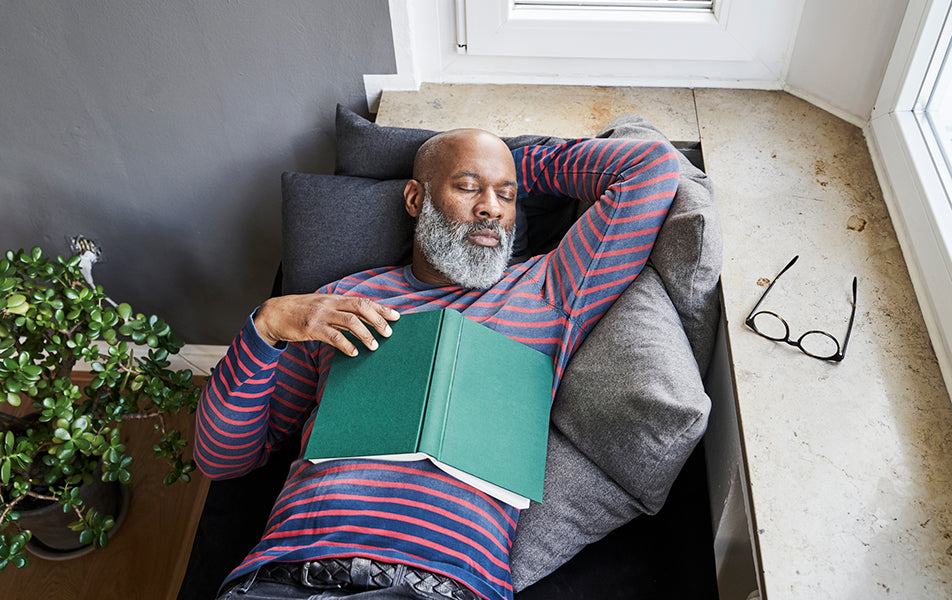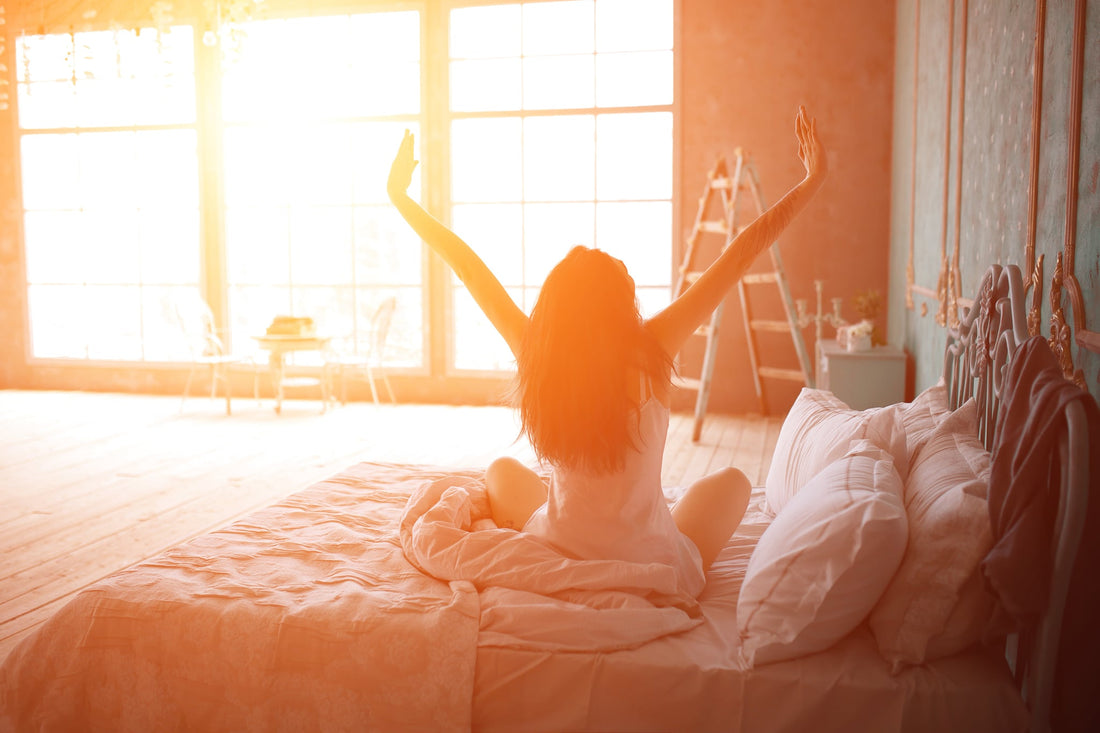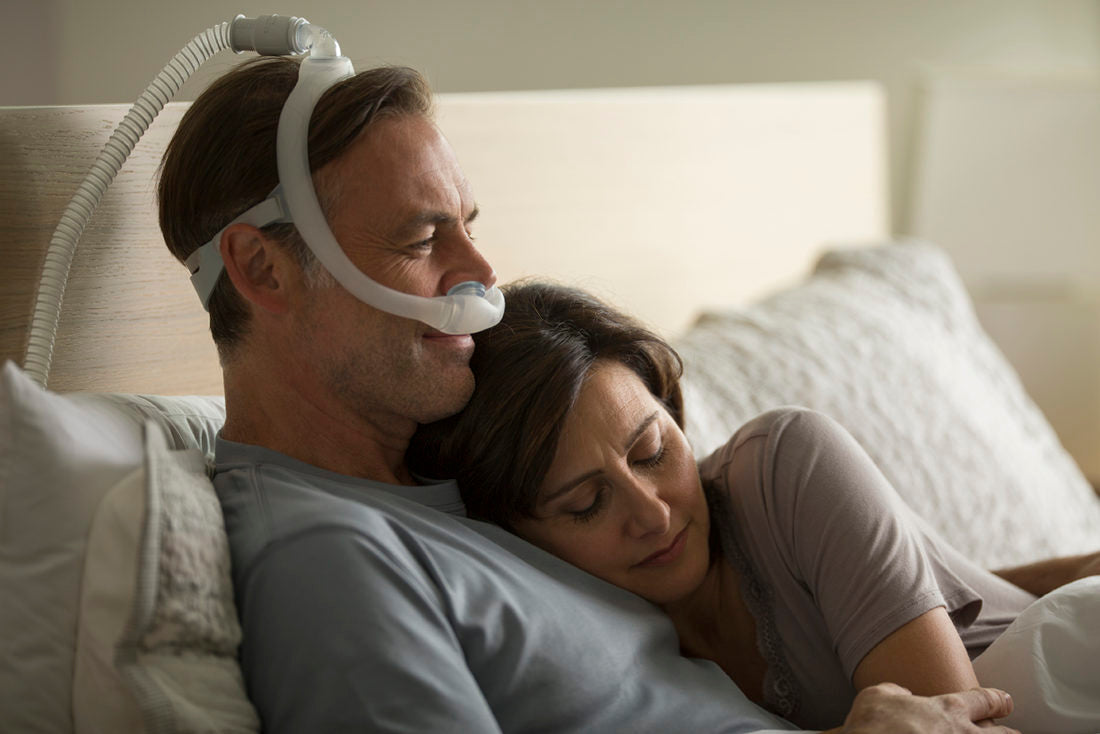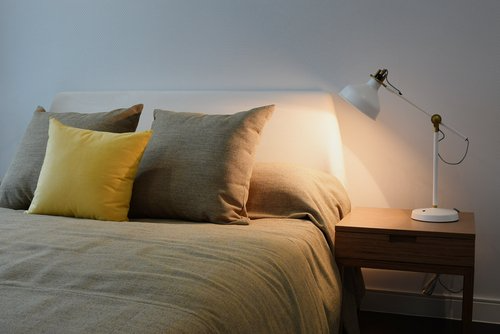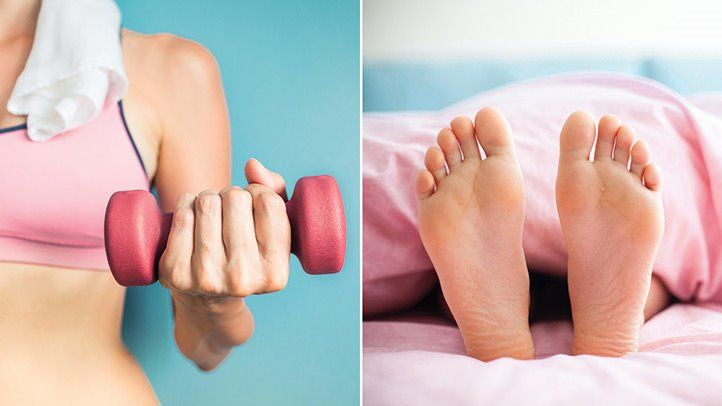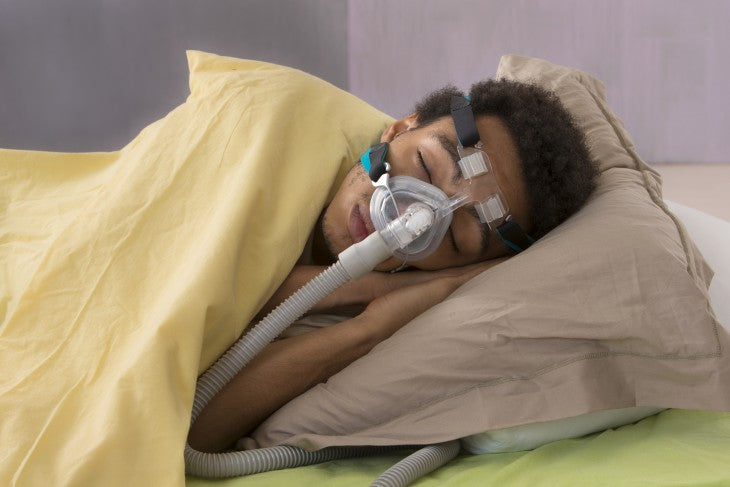News
Summertime Sleeping Tips
wp:paragraph Are these long and hot summer days causing you to stay awake at night? /wp:paragraph wp:paragraph Getting a good night’s sleep in the summer can be a bit trickier than you think. The days are much longer and the sun sets later. The hottest months of the year may also bring a change in your routine and schedules and adding a hot and stuffy bedroom into the mix does not help. /wp:paragraph wp:paragraph While it may seem impossible, there is actually a lot you can do in order to sleep better in the warm weather. /wp:paragraph wp:paragraph Here are seven tips for sleeping better in the summer heat /wp:paragraph wp:list {"ordered":true,"type":"1"} Keep your bedding light and breathable. Avoid any heavy materials such as flannel, this can make you sweat at night and cause sleeping to be very uncomfortable. You may also want to put away your warm winter comforter and switch to something lighter. Be mindful of your sleeping attire as well. Choose pyjamas with lighter and more breathable materials, such as cotton, that does not overheat you. Keep hydrated throughout the daytime, but don’t drink too much too close to bedtime. Get plenty of sunlight in the morning and keep the lights dim at night, this will help your circadian rhythm that sets your internal clock. Keep your bedtime consistent each night. Although you may find your schedule has changed a bit with the summer, especially with the easing of pandemic restrictions, going to bed too late can mess up your sleep cycle. Keep your bedroom on the cool side to make it more comfortable for sleeping, but not so cold that you’re shivering. If necessary, use a fan to circulate air around the room. Try taking a shower before you go to sleep, especially if you were active outside during the day. Sweat, sunscreen and bug spray that may be lingering can cause skin irritation if it is not rinsed off properly. Getting clean can also make you feel more comfortable when you go to sleep. /wp:list
about Summertime Sleeping TipsWhy CPAP Users Need a Support Team
wp:paragraph Starting a new journey with a CPAP machine can be challenging and terrifying. While you may feel excited to finally get your sleep apnea under control, you may not know much about the device, and learning to use it properly may take some time. You may also feel overwhelmed at the fact that you have to use this machine in the first place, and get used to sleeping with it each night. /wp:paragraph wp:paragraph One of the best things you can do for yourself is to establish a support team. Having people who support you and are there to help you is the key to success when you are on your CPAP journey. /wp:paragraph wp:paragraph Your CPAP support team may consist of the following people; /wp:paragraph wp:paragraph Friends and Family /wp:paragraph wp:paragraph While your loved ones may not be going through the same thing you are, don’t rule them out from your support team. These people know you the best and can lend a listening ear and provide words of encouragement. Also, don’t rule out your spouse, they are the ones sleeping next to you each night, and having them on your side can be crucial to successful CPAP therapy. /wp:paragraph wp:paragraph Your trusted medical professionals /wp:paragraph wp:paragraph Keeping a good relationship and open communication with your doctor and/or your medical team is important. They make important decisions with your medical care, so it is important that you are involved and you are able to speak up when there is an issue. /wp:paragraph wp:paragraph Other CPAP patients /wp:paragraph wp:paragraph Finding other CPAP users to connect with can be very helpful and can be a great outlet to ask any questions. They can also empathize with some of the more difficult and challenging parts of using a CPAP machine. There are many support groups out there for CPAP users, some that meet virtually and others that meet in person, your doctor may be able to recommend something that is local. There are also many online forums out there for CPAP users, and this can be a great place to go if you are not comfortable with face-to-face interaction. /wp:paragraph
about Why CPAP Users Need a Support TeamIs Sleep Apnea Hurting your Relationship?
Having sleep apnea doesn’t just affect your health and daytime function. Did you know that sleep apnea can have a big impact on your romantic relationships? Don’t let sleep apnea tear your relationship apart! It is actually quite common for couples to experience tension in the relationship because of sleeping issues, and untreated sleep apnea has been known to lead to many problems in the relationship. Snoring is a very common symptom of sleep apnea that may be interfering with your partner’s ability to get a good night’s sleep. You may also find that you wake up many times throughout the night as a result of sleep apnea episodes, which could also disturb your partner’s sleep. Although it may seem discouraging, there are ways to fix this. A bad night’s sleep for either of you could lead to poor concentration and sleepiness during the daytime and could lead to fighting, resentment, hostility, and a lower desire for intimacy. While treating your sleep apnea is essential, it is important to take your partner’s needs into account as well, they deserve a good night’s sleep too! A few tips for sleep apnea patients to improve their relationship; First of all, communication is key in any relationship. Lashing out at each other when you are both overtired will not help to improve your relationship in any way. If you think you have sleep apnea, or if you think your partner may be experiencing symptoms, it is important to have a conversation about these issues and seek help from your doctor if needed. If you or your partner need to sleep in another room temporarily to sleep better, there is no shame in that. That way both of you can wake up feeling well-rested. If you do sleep in the same room together, don’t rule out the use of an earplug or a white noise machine. Finally, be sure to stick to your CPAP treatment! While the CPAP mask may have you feeling less attractive to your spouse, remember that this is essential for getting a good night’s sleep, and in turn, your partner will sleep better as well and your relationship will improve if you are both well-rested. Visit Papsmart to shop CPAP machines and supplies to find the CPAP machine and mask that is right for your needs.
about Is Sleep Apnea Hurting your Relationship?How to Create the Perfect Sleeping Environment
wp:paragraph You may already know the importance of creating good sleeping habits overall, but did you know just how much of an impact your sleeping environment has? /wp:paragraph wp:paragraph Making your bedroom the perfect sleeping environment is essential for a good quality sleep each night, so that you can function well during the daytime. After all, you spend a third of your life sleeping, so skipping out on a quality sleep is not something you want to do! /wp:paragraph wp:paragraph Here are six tips for creating the perfect environment for sleeping /wp:paragraph wp:list {"ordered":true,"type":"1"} Keep the room dark while you sleep: leave the lights off and use blackout curtains. Bonus tip: chose a color for your bedroom walls to help promote a calm environment and avoid anything too flashy. Keep the room temperature a little on the cooler side: having a cool room is best for sleeping, but make sure you are not so cold that you are shivering at night. Keeping your room too warm can be uncomfortable and you may find yourself tossing and turning. Leave electronics out of the bedroom: many people like to fall asleep with the TV on but this is not recommended, keep it in a separate room. You should also try and leave your phone and tablet charging in another room overnight. Be mindful of any noise: background noise can be distracting while you are trying to sleep. If you are a light sleeper and you wake easily, you may want to consider using a white noise machine. Use your bedroom (and especially your bed) for sleeping only: resist the temptation to use your bedroom as an office, lounge area, or social space and keep the clutter in your bedroom to a minimum. This way you can fully relax once it’s bedtime and you won’t feel anxious about other life factors. Make sure your bed is comfortable: invest in a good quality mattress and pillows (depending on which position you sleep in) and don’t overdo it with the covers. /wp:list
about How to Create the Perfect Sleeping EnvironmentCan Exercise Improve your Sleep Apnea?
wp:paragraph Did you know that exercise has numerous benefits for your overall sleep cycle? This is especially true if you suffer from sleep apnea. /wp:paragraph wp:paragraph Not only can proper exercise help you to fall asleep faster, but it can improve your quality of sleep overall. If you suffer from sleep apnea, many studies have made numerous connections between weight loss (which includes diet and exercise) and an improvement in sleep apnea symptoms. Most severe cases of sleep apnea will still require further medical treatment such as a CPAP machine and exercise is not a cure for sleep apnea, however, a healthy change in lifestyle can certainly lessen the severity of your symptoms. /wp:paragraph wp:paragraph If you find you are sitting more and more these days and want to pick up some healthy exercise habits, here are a few tips to get started: /wp:paragraph wp:list Start small and low impact: all you need to do is get moving! Start with a short walk or maybe do a short exercise routine online, then you can build up the momentum afterwards to do something that challenges you a little more. Stick to something you enjoy: it’s easy to fall off track if you are doing an exercise routine you are not enjoying. Maybe the treadmill is not your thing but if you enjoy another sport or activity that gets you moving then stick to that. Ask for support: having support from a friend, family member or partner can be extremely beneficial in your journey and can motivate you to stick with it. Avoid high intensity activity within 1-2 hours to bedtime: all those endorphins that get released during exercise are great, but not at the end of the day when you are trying to slow down and get into a sleeping routine. Don’t skip out on healthy eating: diet, sleep and exercise are all important parts to maintaining a healthy lifestyle. Stick to your CPAP treatment: while exercise can improve your sleep apnea symptoms, it is not a cure, and not using your CPAP machine can only make your symptoms worse. /wp:list
about Can Exercise Improve your Sleep Apnea?Four Myths about Sleep Apnea
wp:paragraph Sleep apnea, as you may know, is a condition that causes a pause in your breathing for approximately 10-30 seconds while you sleep and can happen up to several times in a night. There are many myths and misinformation around sleep apnea given how complex the condition can be. Here are four myths you may or may not have heard about sleep apnea. /wp:paragraph wp:paragraph 1. Only older adults get sleep apnea. /wp:paragraph wp:paragraph This is not true. While most cases of sleep apnea occur in middle-aged adults, you can develop sleep apnea at any age. It can even occur in children! That said, the risk of developing sleep apnea does increase as you get older, however the condition is not at all based solely on age. /wp:paragraph wp:paragraph 2. Sleep apnea is the same thing as snoring. /wp:paragraph wp:paragraph Not necessarily. Snoring is very common in adults, however it is actually different from sleep apnea. Snoring is certainly a common symptom that leads to a sleep apnea diagnosis, however you can still snore at night and not have sleep apnea. /wp:paragraph wp:paragraph 3. Only people who are overweight can develop sleep apnea /wp:paragraph wp:paragraph While the risk of developing sleep apnea does increase if you are overweight, this is not necessarily true. Loosing weight and adapting a healthier lifestyle can certainly lessen the severity of your sleep apnea symptoms, but this is not a cure. It is important to speak with your doctor if you think you have sleep apnea and they can conduct the proper testing and discuss treatment options to help you sleep better. /wp:paragraph wp:paragraph 4. Sleep apnea will go away on it’s own /wp:paragraph wp:paragraph False! Sleep apnea is a serious condition that needs medical attention. If left untreated, this can cause a number of health issues including stroke, diabetes, heart disease and mental illnesses such as depression. Depending on the severity of your sleep apnea, your doctor may recommend some lifestyle changes if you have a mild case. More severe cases of sleep apnea may require you to wear a CPAP mask at night in order to treat it (more information about CPAP masks and accessories can be found at papsmart.com). /wp:paragraph
about Four Myths about Sleep ApneaCPAP and COVID19: Your Questions Answered
wp:paragraph If you have Sleep Apnea, you may be worried about CPAP and COVID19. Take a read below for tips and info. /wp:paragraph wp:paragraph Does having Sleep Apnea make me high risk for COVID19? /wp:paragraph wp:paragraph There is no evidence linking sleep apnea with coronavirus risk. According to the centre for disease control (CDC), People who have a higher risk for severe illness from the coronavirus include: /wp:paragraph wp:list 65 years of age or older Those with serious underlying medical conditions. Those who are immuno-compromised Those who have been close contact with another person who has the coronavirus. /wp:list wp:paragraph What should I do if I have symptoms (should I use my CPAP while sick)? /wp:paragraph wp:paragraph If you have symptoms of the coronavirus, you should isolate yourself in a separate bedroom and use a separate bathroom, if available. In this “recovery room,” you should continue to use your CPAP while you sleep alone. Evidence suggests that use of CPAP is more likely to produce large droplets (>10 μm) rather than aerosols, and that these are largely confined to within one meter due to their large mass.This suggests that the risk of droplet dispersion as a result of use of CPAP is not a major issue, and is probably no different than any COVID-19 patient in the who is coughing or sneezing without CPAP. /wp:paragraph wp:paragraph Any extra cleaning tips? /wp:paragraph wp:paragraph The centre for disease control (CDC) recommends cleaning and disinfecting your medical equipment according to the manufacturer’s instructions. The directions for CPAP masks and hoses normally include regular cleaning with soap and water. /wp:paragraph wp:paragraph The CDC also recommends that you clean and disinfect frequently touched surfaces in your household. This includes door knobs, light switches and handles. Learn more from the CDC about how to clean and disinfect your household. /wp:paragraph wp:paragraph /wp:paragraph wp:paragraph /wp:paragraph wp:paragraph Newly diagnosed with OSA and need CPAP? Shop CPAP, CPAP Masks, and Accessories Now! /wp:paragraph
about CPAP and COVID19: Your Questions AnsweredFestive Season 2020 - CPAP Tips
wp:paragraph It's going to be a very different festive season this year. Not as much cooking and shopping and going out to holiday gatherings as we're used to. While we can still find ways to have fun in our social bubbles, the stress of 2020 can also get exhausting. That's why getting enough quality sleep is more important than ever. /wp:paragraph wp:paragraph If you use a CPAP machine to help address your sleep apnea, you may be inclined every so often to skip using it. After all, the 2020 holiday season could make you just want to slip quickly into bed for some sleep. But definitely don't fall into that habit! No matter how enticing your bed may be, always take a few minutes to set up your CPAP machine for use at night. /wp:paragraph wp:paragraph Here's why... /wp:paragraph wp:paragraph You may think that missing one night here and there, especially during the holidays, won't really make a difference in the long run. But what you are doing is setting up the foundation for the habit of not using your CPAP machine. When you don't use your machine - even for one night - you run the risk of having a poor quality sleep. As you gradually become more and more fatigued, you can increase your risks for irritability, headaches, forgetfulness, and even more serious issues such as heart attack or stroke. And more immediately, those headaches and fatigue will mean that you will have less fun during the holidays. And who wants that? /wp:paragraph wp:paragraph So even when you don't feel like it, always be sure to use your CPAP machine to encourage yourself to be the best version of you any time of the year. /wp:paragraph wp:paragraph Newly diagnosed with OSA and need CPAP? Shop CPAP, CPAP Masks, and Accessories Now! /wp:paragraph
about Festive Season 2020 - CPAP TipsAutumn Sleep Tips
wp:paragraph Autumn has arrived! That means crisp days and cozy, comfy sleeps. Or does it? For some people, autumn can means poor sleeps, and this can happen for various reasons. If you are one of these people, or if you just want to ensure restful nights, here are some autumn sleep tips to remember: /wp:paragraph wp:list Get outside: Autumn sees fewer hours of daylight. This lowers the amount of Vitamin D you need, which can leave you feeling even more tired than before. The simple solution is this: get outside! Go for a walk, a hike, or do some gardening, yardwork - anything that gets you into that much needed sunlight. And you get the added benefits of fresh air and sunshine. Stay cool: Yes, those cool days may make you crank up the heat in your home. But there's a problem with that. At night, warmer air can actually interfere with your sleep. Cooler indoor temperatures help you body fall asleep easier because it doesn't have so work as hard to cool itself down. So, the easy answer is: at night, turn down your thermostat! Be happy: Although this one can be a little harder to control, keeping a positive mood will help you fall asleep more easily. Or, if you are feeling stressed and overwhelmed, your body will have more problems relaxing itself enough to encourage a quicker and deeper sleep. Try meditation, get exercise, and give yourself ample time to relax before bedtime. Happy slumbers! /wp:list wp:paragraph Newly diagnosed with OSA and need CPAP? Shop CPAP, CPAP Masks, and Accessories Now! /wp:paragraph
about Autumn Sleep Tips